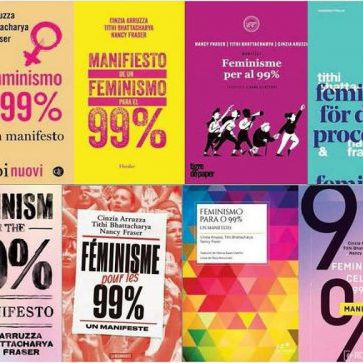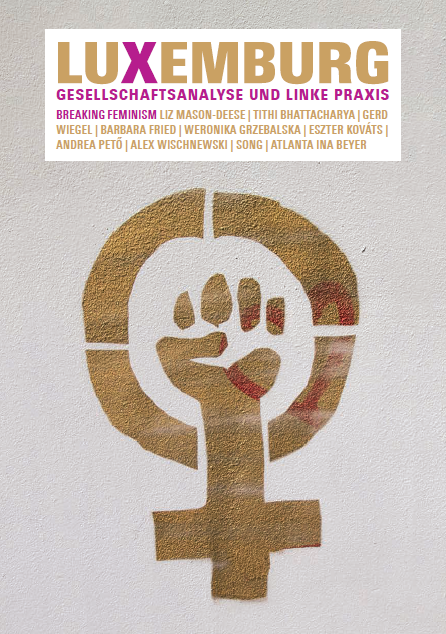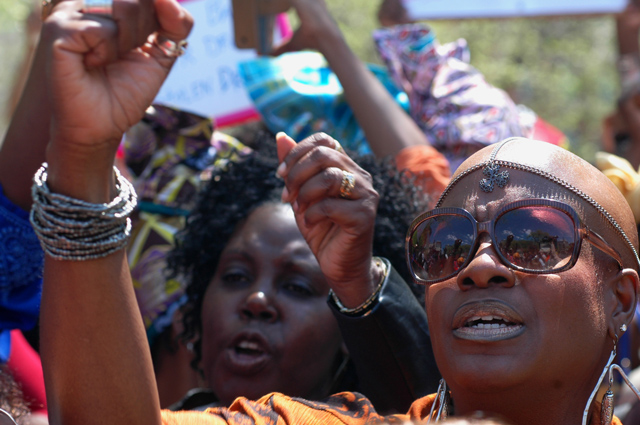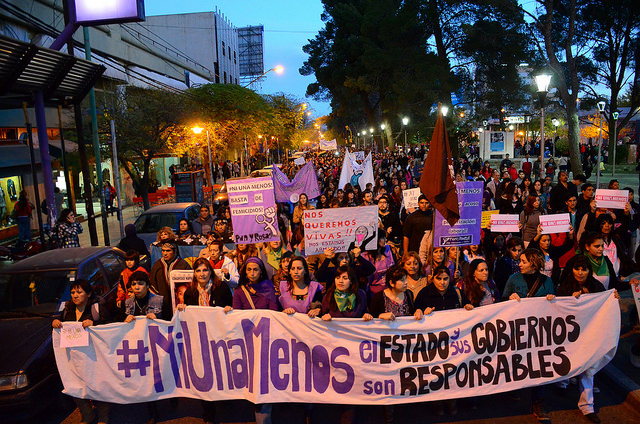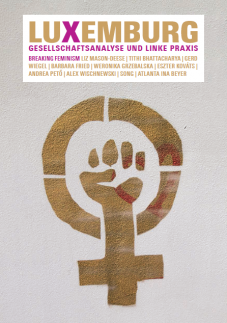| Holy Shit. Gender as a unifying theme for the Right
The AfD’s family and gender politics
Racism, hostility towards refugees and authoritarianism are crucial elements in the ideology of the AfD (“Alternative for Germany”), the new right-wing party which gained around 12% percent of the vote in the 2017 parliamentary elections. When people are scandalised by AfD statements and actions, the focus is usually on these topics. They are central to the public image of the party and its parliamentary group also because the AfD links nearly all policies to the issue of immigration. At the same time there is a polarity within the AfD between the neo-fascist right and the national-liberal centre, mostly around where it stands on the social question. The right of the party is ethnicizing the issue of social conflict, while the centre puts emphasis on a nationalist policy of market radicalism. This dichotomy that is also closely linked to power relations within the party is bridged and blurred by an overarching broad consensus in another field. The issue of family and gender politics is crucial for the party’s ideology and articulated in a fiercly antifeminist way.
The role of family and gender politics in the ideology of the party
When discussing the reasons for the rise of the new radical right-wing party in Germany usually two areas are identified in which the AfD successfully articulates wide-spread fears and discontents. On the one hand, the party takes up issues in a socio-economic domain such as the fear of losing social status and job insecurity. On the other hand, the party is taking up fears and uncertainties related to changes of social values. The AfD offers an attractive proposition to those sections of society that are unsettled by the changes of gender and family roles and by new ways of living and loving. The party offers them political representation, affirms their traditional views and ways of life and defends them against all challenges. Family and gender policies are the key areas for the AfD in this domain and the party is actively claiming a dominant role in these fields. Unlike socioeconomic questions, this topic is largely uncontested within the AfD, so it acts as a unifying theme between the otherwise opposing fractions. It plays a central role not only ideologically, but also in terms of the party’s organisation because it does actually offer positive reference points for very different groups within the party. Whereas the conservative, bourgeoise right wing of the AfD, that is partly influenced by Christian fundamentalist views, puts emphasis on traditional gender roles and sees the family as the nucleus of the state, the neo-fascist right is more interested in the control of reproduction and demographics as well as in forms of masculinism.
With the exception of migration and Islam, no theme is communicated as aggressively by the AfD as that of the entire family and gender policy. Alongside the term ‘Islam’, ‘gender’ could well be a key enemy label in the party manifesto. The issue is addressed from a dominantly male perspective. Only 16% of AfD members are women (by way of comparison: CDU = 25%, Linke = 37%). In the Bundestag elections, the AfD received 10 of the female vote and 15% of the male vote. Of the 92 AfD representatives in the Bundestag, 82 are men. However, all the attitudes surveys conducted over many years have shown that the issues covered by the AfD, especially in the field of refugees and migration, are supported equally by women and men. The AfD therefore has untapped potential among female voters. Developments since the Bundestag elections appear to indicate that the AfD intends to do more to exploit this potential. After the elections Alice Weidel, Leader of the AfD faction in the Bundestag, announced that she wanted to make the Bundestag faction more female and to attract more women to the AfD through new themes. She mentioned the party’s inadequate response to the issue of combining family and career.[1]
The party manifesto and its implementation in parliament
In the first six months, the AfD Bundestag faction has been attempting to address the topics in the area it outlined in its manifesto. They include a commitment to the “traditional family as a role model”, a commitment to “strengthen the role of parents and counter gender mainstreaming’s stigmatisation of traditional gender roles”, and a commitment to “more children instead of mass immigration” as an expression of an active population policy based on populist, nationalist principles.[2] Drawing on these themes, the AfD election manifesto states: “Germany needs a paradigm shift towards a national population policy.” With this policy, the AfD claims to be fighting against Germany’s “self-abolition”. It aims to rename the Federal Ministry for Family Affairs, Senior Citizens, Women and Youth (BMFSFJ) as the “Federal Ministry for Family Affairs and Population Development”. In order to emphasise the population policy mission of its populist wing in particular, the AfD is also calling for action on women’s capacity for reproduction. In a reference to abortion, it states: “Abortions must be reported. Failure to comply should result in a significant penalty. In this way, it is hoped that abortion statistics will reflect the true number of abortions.” The idea is to apply sanctions primarily to women who oppose the family model set out by the AfD, or who do not want to conform to it. This is the point of the party’s reservations about the state support for single parents (mostly women) – something the party does not aim to abolish completely (as it did in the first draft of its manifesto), but still intends to restrict in the medium to long term. Unlike “nearly every other party”, the AfD claims that it does not stand for “unconditional support for single parents”, and instead calls for “differentiation between cases where this situation was caused by bad luck, the individual’s own fault or as a result of their own decisions.” This is also the purpose of another AfD demand: “Serious misconduct against marital solidarity must be taken into account again in the legal consequences of divorce.” Ultimately, the AfD brands “gender ideology” as “anti-constitutional”.[3]
Since October 2017, the AfD Bundestag faction has had the opportunity to implement these manifesto announcements, and in the first few months it has in fact made its mark, particularly in the area of family and gender policy. Three approaches have dominated so far: firstly, the AfD Bundestag faction is attempting to disguise its central theme of anti-Muslim racism as an active policy for the protection and rights of women. Secondly, any form of systematic discrimination against women is questioned by the AfD and any measures to combat it vilified as an expression of “gender ideology”. Thirdly, the AfD faction is using parliamentary questions as a way of affirming its family policy vision.
When the AfD organised two so-called ‘Women’s Marches’ in Berlin, supposedly to draw attention to violence against women and the alleged disregard for women’s rights by Muslims in Germany, the AfD Bundestag faction used the protests against the first of these marches as an opportunity to call in an ad hoc debate in the Bundestag entitled “Strengthening women’s freedom and equality – constitution, not parallel society”. In the debate, AfD Bundestag member Nicole Höchst used the alleged murder of a 15-year-old girl by her under-age Afghan boyfriend as an opportunity to present the AfD’s anti-Muslim racism as a way of protecting women’s rights. The “Islamisation of Europe” was, she claimed, responsible for the creeping and politically unopposed theft of women’s basic rights, for which the “opinion monopoly” of the “educating press” was partly responsible.[4] The linking of anti-Muslim resentment to the supposed protection of women is used repeatedly by the AfD in debates. For example, AfD Bundestag member Gottfried Curio argues: “If, because of a failed immigration policy, our women are soon to find themselves facing a majority of young men from archaic, misogynistic societies: are women to start avoiding wearing short skirts, then start covering their hair with a headscarf, until they eventually have to walk around shut inside a burka? Are safe spaces to become a scarce commodity and evening jogging a test of courage? It must not come to that.” (Minutes of the 14th session of the 19th legislative period, p. 1112)
In the debate on International Women’s Day, AfD representative Nicole Höchst vehemently opposed an alleged “equality totalitarianism”, which would, she claimed, destroy “the standing of millions of free, self-determined women” through quotas and other forms of assistance. Höchst denied any form of structural discrimination against women – “Structural discrimination against women is like a yeti: everyone talks about it, but no one has ever really seen it” (19th legislative period, minutes of 17th session, p. 1387). She proceeded to talk about the structural discrimination against women in Islam, which, she claimed, posed the real risk to women in Germany: “They are handing us over to the gender segregation and systematic discrimination against women that is structurally embedded in this so-called religion. They are leaving our daughters and granddaughters with an Islamised German state in a centrally governed Islamic Europe.” (ibid.)
Marc Jongen, one of the ideological masterminds of the AfD Bundestag faction, complained that through “gender mainstreaming”, the “battle of the sexes in our educational establishments and authorities is being set up for the long term, by order of the state. As a result, the relationship between the sexes has been exposed to a permanent and subliminal poisoning.” Behind this he sees an “attitude dictatorship that is gradually taking on Orwellian proportions (…).” (Deutscher Bundestag, 19th legislative period, minutes of the 12th session, p. 985)
The AfD is currently raising the issue of demographics and birth rates, primarily in the form of written requests in parliament. The AfD has asked the government about possibilities for “increasing the birth rate in Germany with the help of family policy measures” (printed paper 19/2584). It cites as the central problem: “There are too few German children being born” (ibid), which immediately reveals the issue at stake. In its question on “long-term effects and consequences of early external childcare” (printed paper 19/2239), the party supplies the applicable family model and role pattern. Extract from the question: “One of the dangers for children, according to the study, is that crèches, if they are used too early, too often and for too long, can weaken the maternal feeling – or even prevent it developing at all. This happens primarily in mothers who already had a weak bond with their child.” (ibid)
Connecting factors of the AfD’s policy
Despite its obviously reactionary character, the positions of the party in the field of family and gender policy are also connected to real needs and problems that the party claims to address in its proposals, for instance in their criticism of the adult-worker-model. The all-encompassing claim of neoliberal capitalism to call on individuals’ labour at any time is not experienced as self-realisation and emancipation by everyone. Particularly for many women it is often linked to double burden within the framework of a patriarchal division of labour, imposing the larger share of reproductive work on their shoulders. With the magic slogan “freedom of choice”, the AfD is articulating the existing desires of some women to escape (at least temporarily) the constant pressure of availability for the job market. The return to traditional role patterns thus appears as a free choice and as a liberation from a supposedly one-sided and enforced model of emancipation for women. The desired upgrading of family and care work is aimed primarily at women, who are to be offered the family as a “refuge”. So far, the AfD has not raised the issue of an equal distribution of family work between men and women or made demands to make family and work more compatible. The party has in some cases even firmly rejected these ideas – despite the claim by the leader of the AfD Bundestag faction cited above. In its manifesto, the party is generally opposing state involvement in matters of raising children: “The increasing assumption of child-raising duties by state institutions like crèches and all-day schools, the implementation of the ‘gender mainstreaming’ project and the general emphasis of individuality are undermining the family as a basic values-generating unit of society. The economy wants women as workers. A mistaken feminism only values women at work, but not women who are ‘only’ mothers and housewives. These women often experience less recognition and are financially disadvantaged.”[5]
By framing its anti-Muslim racism as a kind of “protection” of women against the dangers of a patriarchal Islamism the party also connects with real experiences and problems of Germany’s migrant society. Since the 2015/16 New Year’s Eve events in Cologne and the killings of young women by refugees, if not before, the AfD’s forcefully communicated threat discourse has met with an opinion, spread partly by the media, that this is a specific form of threat. The aforementioned ‘Women’s Marches’ initiated by the AfD are the party’s attempt to use these sentiments to its own advantage and to put itself forward as the true guarantor of emancipation and women’s rights.
At the end of the day, the party’s positions on family and gender policy connect with key uncertainties among its core voters: male, middle-aged and skilled workers.[6] In addition to the socioeconomic uncertainties in this group, questions about their own role perception also play an important part. The sole breadwinner model has been eroding for a long time, but for some years now this process is compounded by the fact that the qualification of the largely male pool of skilled labour is being called into question. This is perceived by some of the male AfD voters as a further attack on their own role model. Here too, the AfD offers clear identity models that counter these uncertainties and account for part of the party’s attraction for its largely male following.
Translated by Tim Jack, lingua transfair
Notes
[1] See www.zeit.de/politik/deutschland/2017-10/afd-weidel-regierung-2021 (accessed 20 June 2018)
[2] All citations from the Alternative für Deutschland manifesto, p. 41
[3] All AfD citations: Programm für die Wahl zum Deutschen Bundestag 2017 (manifesto for the German Bundestag elections 2017), p. 36–38
[4] See Deutscher Bundestag, 19. Wahlperiode, Protokoll 7. Sitzung (minutes of the 7th session of the 19th legislative period) p. 585 ff.
[5] Alternative für Deutschland party manifesto, p. 41
[6] See Horst Kahrs, Jenseits der Statistiken sozialer Ungleichheit. Facetten modernisierter Beziehungen zwischen Arbeitswelt, Lebenswelt und Politik, in: Sozialismus 7–8, 2016



